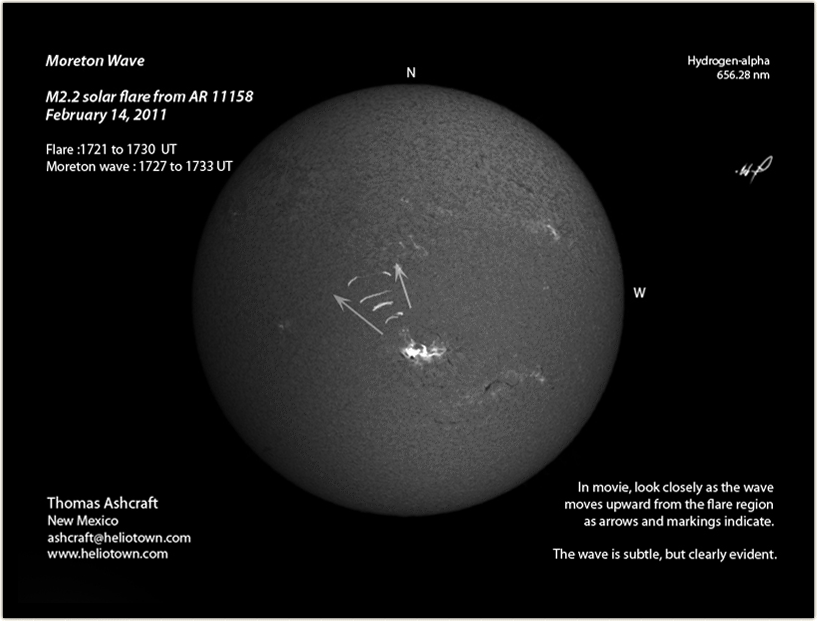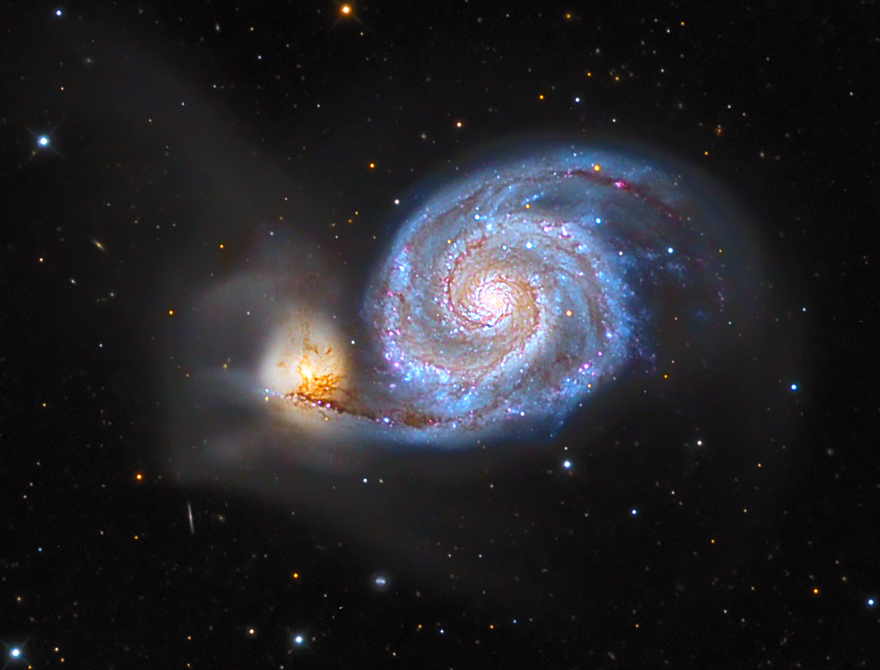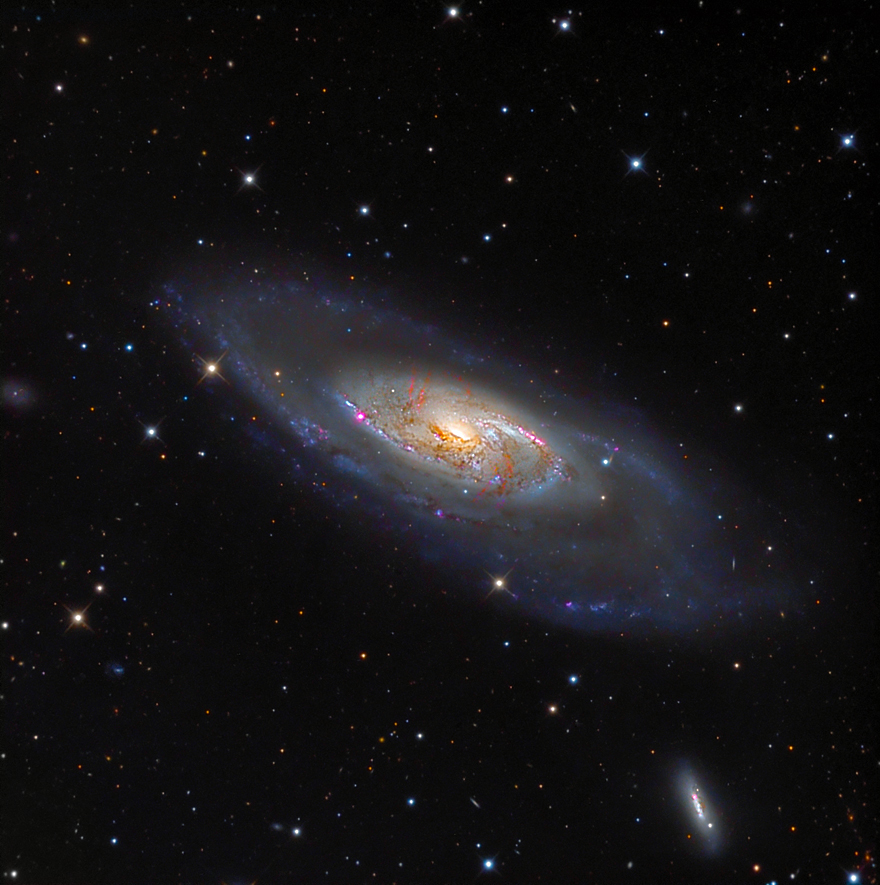Page 1 of 1
Recent Submissions: 2011 April 29-May 2
Posted: Fri Feb 04, 2011 4:56 am
by owlice
________________________________________________________________________________________
Please post your images here.
Please see
this thread before posting images; posting images demonstrates your
agreement with the possible uses for your image.
Thank you!
_______________________________________________________________________________________
<- Previous submissions
Re: Recent Submissions
Posted: Fri Apr 29, 2011 11:32 pm
by nuclearcat
Messier 101 Pinwheel Galaxy
Data: RTT 150 Archive, TUBİTAK National Observatory (TUG) Processing: M. Raşid Tuğral
Re: Recent Submissions
Posted: Sat Apr 30, 2011 10:26 am
by owlice
Spinning the Milky Way into the Rising Twilight
http://www.sc.eso.org/~jgirard
Copyright: Julien Girard
[attachment=2]image-4.jpg[/attachment]
[attachment=3]image-3.jpg[/attachment]
Dark Red Streaks on the NED
http://saturn.cstoneind.com
Copyright: Christopher Go
[attachment=1]saturn20110428.jpg[/attachment]
Moreton Wave
http://www.heliotown.com/Moreton_wave_Ashcraft.html
Copyright: Thomas Ashcraft
Circumzenithal Arc
Copyright: Joshua Bury
[attachment=0]cza_Bury.jpg[/attachment]
Re: Recent Submissions
Posted: Sat Apr 30, 2011 3:32 pm
by owlice
Stars and Lightning
http://www.steveirvine.com/astro
Copyright: Steve Irvine
[attachment=5]stars_lightning_irvine_1000px.jpg[/attachment]
The Mother Road and the Milky Way
http://www.flickr.com/photos/7597174@N0 ... /lightbox/
Copyright: Steve Vuoso
[attachment=4]MilkyWayHighway.jpg[/attachment]
Moon Colors
Copyright: Manuel Cabrera
[attachment=3]the color of the moon.jpg[/attachment]
NGC 3603 and 3576
http://www.astro-cabinet.com
Copyright: Dieter Willasch
[attachment=2]ngc3603_3576_dw1.jpg[/attachment]
The Circling Sky
http://www.ccdsky.eu
Copyright: Christoph Puetz
[attachment=1]kaernten_serie1.jpg[/attachment]
NGC 5613 (Arp 178)
http://www.caelumobservatory.com/gallery/n5613.shtml
Copyright: Adam Block/Mount Lemmon SkyCenter/University of Arizona
Sun Halo
Copyright: Ariana Andreo
[attachment=0]suntower.jpg[/attachment]
Re: Recent Submissions
Posted: Sat Apr 30, 2011 4:18 pm
by owlice
Canopus through the Dew
http://www.astronomy.mq.edu.au/space2grow
Copyright: Michael Fitzgerald
[attachment=1]hourexpoverberrara.jpg[/attachment]
M51: Whirlpool Galaxy
http://www.starkeeper.it/M51RC.htm
Copyright: Leonardo Orazi
Brocken Spectre and Fogbow
http://www.david-noble.net
Copyright: Dave Noble
[attachment=0]Fogbow.jpeg[/attachment]
Re: Recent Submissions
Posted: Sat Apr 30, 2011 4:37 pm
by owlice
Clouds Bar Code
Copyright: Roberto Quevedo
[attachment=0]pc152030_mac_lr_temp_sat_ton.jpg[/attachment]
Re: Recent Submissions
Posted: Sun May 01, 2011 6:32 am
by Ann
I love Adam Block's image of Arp 178. What a quartet, no, what a quintet of galaxies and what a fantastic "centerpiece"!
The large galaxy, NGC 5614, is incredible. Note how many different populations are visible in it! The bulge is strongly yellow. It reminds me of those big elliptical galaxies that were recently found to contain tremendous numbers of small red dwarfs. That's the impression I get when I look at the bulge of NGC 5614, that it is jam-packed with small M-type dwarfs. But I also think that the bulge of this galaxy is full of stars with a really high metallicity, which is also typical of large elliptical galaxies (or so I think anyway).
Then there is a fascinating blue ring surrounding the very yellow nucleus. But I don't think that the blue ring is active or that it contains any recent star formation. Look how smooth the blue ring is, not at all clumpy. Ongoing active star formation typically looks very clumpy. Besides, in James D Wray's Color Atlas of Galaxies, which shows galaxies in UBV, the ring surrounding the bulge of NGC 5614 is all green, even yellow-green, and contains no hints of blue at all. That suggests that the ring of NGC 5614 contains many bluish stars of spectral class A and F, but probably no stars of spectral class O and B. This in turn means that the ring is the fossil remnant of a bright burst of ring-shaped star formation in the past. Note that we can even see that the lower part of the ring appears to be slightly younger than the upper part of it!
Outside the blue ring is a dusty disk, strongly dominated by the brown color of dust and mostly, but not completely, devoid of star formation. Note the pink emission nebulae in the part of the disk that is "above" the bulge.
Outside the dusty disk is a mostly dust-free, smooth population, yellow close to the dusty disk and slightly bluer further out. Typically, stars outside the bright disk of a galaxy are often relatively young.
Now take a look at the squarish yellow shape with a bright band through it at 5 o'clock. What is that thing? Why, it's a small galaxy, and the bright band must be a bar! The galaxy is NGC 5615, and it reminds me of M32, the closest of the satellite galaxies of Andromeda, in that NGC 5615 is also very bright, very small, very yellow and very close to the large galaxy that it is orbiting. The main difference is that NGC 5615 is not as compact as M32 but more extended because of its bar. NGC 5615 is only three magnitudes fainter than NGC 5614, but M32 is almost five magnitudes fainter than M31.
Note how a fantastic blue "plume" of stars appears to emerge from NGC 5615. The plume is bent in a general "direction of rotation" around NGC 5614, except I'm not sure I managed to express that quite correctly. But with that fantastic long bent "tail" behind it, generally pointing away from NGC 5614, the entire small galaxy of NGC 5615 reminds me of a comet about to plunge into the Sun - and the "Sun" in this case would be galaxy NGC 5614, of course!
There are three other galaxies in the picture. NGC 5613 is the galaxy to the lower left of NGC 5614. NGC 5613 has an oval bulge which is yellow but not not as orange-yellow as the bulge of NGC 5614. Smaller galaxies are typically more metal-poor than large galaxies, and their yellow old population is not as strongly yellow in color as the old population of large galaxies. NGC 5613 also has a ring structure around its bulge, but this ring is more neutral-colored than the ring of NGC 5614. This is an older structure. The ring is brighter to the right and to the left of the bulge than it is above and below the bulge. When a ring looks like this, there is usually a bar across the bulge that ends at the bright parts of the ring, which are called bar-end enhancements. But in this case the bright parts of the ring are located perpendicularly to the oval, bar-like bulge. NGC 5613 "all but ends" outside the bright ring, but there are two large, extended, wide-ranging, rather faint blue spiral arms outside it. These arms may originate at the two brightest points of the ring.
In the lower left of the picture is another spiral galaxy, which may well be part of the NGV 5613-5614-5615 action. But my software has nothing to say about this galaxy more than that it is designated NGC 5609, that it is a spiral galaxy and that it is "most extremely faint". So I won't say more about it, either. In the far right of the picture is a fifth galaxy, which looks like a dwarf spheroidal to me, but my software can't even find it!
What an extremely fascinating image, Adam!
Ann
Re: Recent Submissions
Posted: Sun May 01, 2011 6:34 am
by lup974
Celestial spectacle in Reunion Island
http://www.lucperrot.fr/
Copyright: Luc Perrot
On Sunday, May 1st, 2011, 5:56 am: while the city of Saint-Denis still sleeping and while some fishermen seem to return towards Saint Marie's port, the sky offers us a rare planetary conjunction. Indeed, on this photo the moon is accompanied with planets Venus, Mercury, Mars and Jupiter.
Re: Recent Submissions
Posted: Sun May 01, 2011 6:53 am
by owlice
NGC 5194 and NGC 51955
http://www.astrodad.com
Copyright: Max Corneau
[attachment=0]ngc-5194_ap206_l60r40g25b30.jpg[/attachment]
M106: Seyfert Type Galaxy
http://www.starkeeper.it/M106RC.htm
Copyright: Leonardo Orazi
Re: Recent Submissions
Posted: Sun May 01, 2011 5:38 pm
by owlice
Heart and Soul Nebulae
http://users.skynet.be/dk.astro.photo/
Copyright: Didier Keus
Re: Recent Submissions
Posted: Sun May 01, 2011 6:35 pm
by asymon
Tulip Nebula Region
http://www.woodlandsobservatory.com
Copyright: Alistair Symon
Re: Recent Submissions
Posted: Sun May 01, 2011 9:30 pm
by Dieter Willasch
Tarantula Region
http://www.astro-cabinet.com
Copyright: Dieter Willasch
[attachment=0]tarantula.jpg[/attachment]
http://astro-cabinet.com/uploaded/origi ... GB1_ss.jpg
Re: Recent Submissions
Posted: Sun May 01, 2011 9:37 pm
by Dieter Willasch
Bipolar Nebula NGC 6164/5
http://www.astro-cabinet.com
Copyright:Dieter Willasch
[attachment=0]bipolar.jpg[/attachment]
http://astro-cabinet.com/uploaded/origi ... 90mRGB.jpg
Re: Recent Submissions
Posted: Mon May 02, 2011 3:30 am
by sguisard
Orion above Atitlan Lake, Guatemala
http://www.astrosurf.com/sguisard/Pagim/Atitlan.html
Stéphane Guisard
Re: Recent Submissions
Posted: Mon May 02, 2011 9:18 am
by ngc1535
Ann wrote:I love Adam Block's image of Arp 178. What a quartet, no, what a quintet of galaxies and what a fantastic "centerpiece"!
What an extremely fascinating image, Adam!
Ann
Thanks Ann. I really appreciate that you took note of this image. I was not able to find many high resolution color (RGB) images of this Arp example. These galaxies may subtend a small angular countenance- but as you note above there is plenty to be seen.
- Adam
Re: Recent Submissions
Posted: Mon May 02, 2011 9:29 am
by owlice
Bubble Region in Cassiopeia
Copyright: Data acquisition, Jim Misti; processing, Louie Atalasidis
[attachment=4]The Bubble-Region.jpg[/attachment]
Four Planets and the Crescent Moon over Perth
Copyright: Glen Prideaux
[attachment=3]P5012999.jpg[/attachment]
NGC 3521 with Tidal Tails
http://www.kerschhuber.astronomie.at
Copyright: Günter Kerschhuber
[attachment=2]20110304-ngc3521gx.jpg[/attachment]
Sunrise, STS-134
Copyright: James N. Brown
[attachment=1]DSC_1532 copy.jpg[/attachment]
NGC 7023: The Iris Nebula
http://www.eprisephoto.com
Copyright: Anna Morris
[attachment=0]NGC 7023 - LRGB-v2.jpg[/attachment]
Re: Recent Submissions
Posted: Mon May 02, 2011 9:33 am
by owlice
Milky Way with Saguaro
Copyright: John Lawson
[attachment=0]photo.jpg[/attachment]
Re: Recent Submissions
Posted: Mon May 02, 2011 12:10 pm
by ghudepoh
Planetary conjuction over Paranal in Chile
http://www.atacamaphoto.com
Copyright: Gerhard Hüdepohl
Re: Recent Submissions
Posted: Mon May 02, 2011 2:31 pm
by bystander
Planetary Conjunction over Paranal
European Southern Observatory
Picture of the Week - 2011 May 02
ESO Photo Ambassador Gerhard Hüdepohl has captured yet another rare sight.
Yesterday, in the morning of 1 May 2011, about an hour before sunrise, five of our Solar System’s eight planets and the Moon could be seen from Paranal. The four planets in the sky were Mercury, Venus, Mars and Jupiter, and they were joined by the crescent Moon to create this wonderful photo opportunity of a planetary conjunction — two or more celestial bodies seen near each other in the sky, usually from the Earth.
In this photo, the bright crescent of the Moon is illuminated by the Sun (which is just below the horizon), while the darker part receives only light reflected from the surface of the Earth. Venus is the highest and brightest planet, with Mercury below and to the right. Jupiter is directly below Venus, but much closer to the horizon. Mars can be seen just below and to the left of Jupiter; the separation in the sky was less than half a degree. The fifth planet in the photograph is of course the Earth, providing our vantage point for this spectacular conjunction.
This view from Cerro Paranal shows some nearby, and more distant, mountain peaks in the Atacama Desert, one of the driest places on this planet. Three of the ESO Very Large Telescope’s 1.8-metre Auxiliary Telescopes (ATs) are silhouetted in the foreground. Just to the right of the leftmost AT is Cerro Armazones, site of the future European Extremely Large Telescope (E-ELT). Armazones is about 20km from Paranal. Between the ATs on the right is the distant volcano Llullaillaco, on the border of Chile and Argentina. It is much further away than Armazones, at a distance of 190km, but the exceptionally clear atmospheric conditions in the Atacama Desert provide a razor-sharp view, despite the distance. These conditions also help to make the region one of the best in the world for astronomical observations.
Zoomable Image
Without Annotations
Congratulations, Gerhard!
Re: Recent Submissions
Posted: Mon May 02, 2011 8:36 pm
by Ailean4321

absolutely love these photos. wow.









